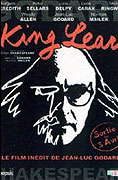Director:
Jean-Luc GodardReparto:
Julie Delpy, Norman Mailer, Woody Allen, Burgess Meredith, Molly Ringwald, Leos Carax, Jean-Luc Godard, Peter Sellars, Michèle PétinSinopsis(1)
Writer Norman Mailer is supposed to write a modern version of Shakespeare's King Lear. The story is set in post-Chernobyl times. The life has got back to the normal, only Art has vanished. William Shakespeare V., sets out to find the lost works of art. (Summer Film School)
Reseñas (1)
Which of the countless levels of significance is the privileged one, in which the creator or viewer can find the key to understanding the film? For people raised on 19th-century bourgeois novels and 20th-century Hollywood films, the film reveals the terrifying (but rather liberating) secret that such a level does not exist. There is only an eternal movement from one instance to another, from one image to another, from one idea to another, without a chance of them merging, and without a chance of their logical chaining. Mutually irreconcilable images find resolution only in the viewer. Here, Godard - brilliantly even by his standards - dissolves the (admittedly fictional) boundaries between the author and his work, between the final product and the process of its creation. In one interview, Godard stated that the most important idea of the film is the idea of capturing the past, present, and future in the act of film montage: here again, we see the dissolved boundary described above. It is because this capture applies not only to cinematic technique but also to the content of the work (the medieval game, the present of Chernobyl, etc.) and its internal references (artworks of the Middle Ages, Shakespeare's era, contemporary personalities, etc.).
()
Galería (7)
Foto © 39. Letní filmová škola

